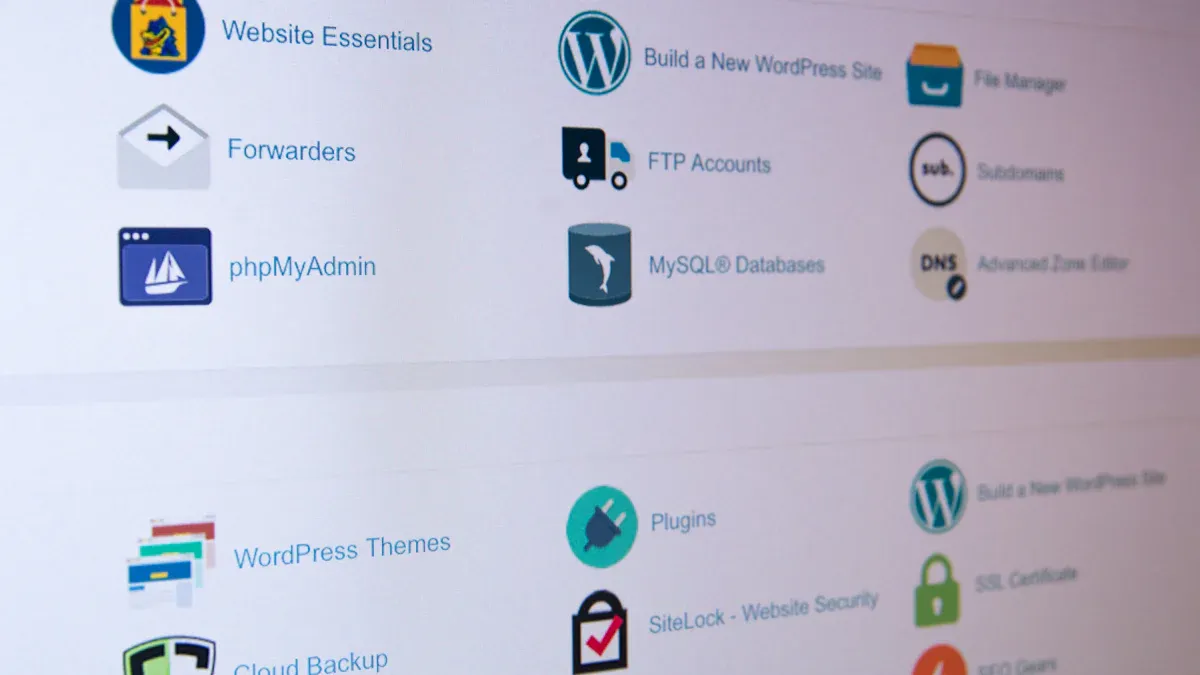Image Source: pexels
Choosing the right web hosting is crucial, especially when considering how to choose the best web hosting
for high traffic sites. I’ve witnessed firsthand how poor hosting can slow down websites, frustrate
users, and drive away potential customers. Speed is essential; pages loading in 2.4
seconds convert better than those taking over 4 seconds. Downtime? It’s a disaster, costing
businesses hundreds of thousands per hour. Hosting impacts everything—site speed, uptime, and even how
quickly data reaches users. That’s why I always prioritize performance, reliability, scalability,
security, and cost-effectiveness when selecting a hosting provider.
Key Takeaways
- Think about what your website needs before picking a host. Check traffic size, website type, and
tech needs to choose well. - Focus on speed and dependability. Pick hosts with 99.9% uptime and tools like caching and CDNs
for faster loading. - Check security options closely. Make sure the host gives SSL certificates, backups, and DDoS
protection to keep your site safe.
How to Choose the Best Web Hosting for High Traffic Sites: Key Considerations
Understanding Website Needs (Traffic, Site Type, Technical Requirements)
Before diving into hosting options, I always assess the specific needs of a website. High traffic sites
demand robust
performance, scalability, and security. For instance, if your site experiences thousands of
daily visitors, you’ll need hosting that ensures fast load times and consistent uptime. Scalability is
equally important. A sudden traffic spike during a sale or event shouldn’t crash your site. Security
features like SSL certificates and firewalls are non-negotiable to protect sensitive user data.
Technical requirements also vary. E-commerce platforms need reliable payment processing and database
management. Content-heavy sites benefit from caching mechanisms and a Content Delivery Network (CDN) to
reduce latency. Identifying these needs upfront helps narrow down hosting options that align with your
goals.
Evaluating Hosting Types (Shared, VPS, Dedicated, Cloud)
Not all hosting types are created equal, especially for high traffic websites. Shared
hosting, while affordable, often struggles with performance due to resource sharing. I recommend
avoiding it for high-traffic sites. VPS hosting strikes a balance between cost and performance, offering
dedicated resources without the hefty price tag of dedicated servers. For maximum control and
reliability, dedicated hosting is ideal, though it requires a higher budget and technical expertise.
Cloud hosting stands out for its scalability and reliability. It pools resources from multiple servers,
ensuring your site remains operational even during traffic surges. This flexibility makes it a top
choice for growing businesses. Choosing the right hosting type depends on your traffic volume, budget,
and technical capabilities.
Assessing Performance and Reliability (Uptime, Speed, Optimization)
Performance and reliability are non-negotiable for high traffic sites. Hosting providers should guarantee
at least 99.9%
uptime, which translates to minimal downtime annually. Speed is equally critical. Slow-loading
pages frustrate users and hurt conversions. I always look for providers that offer caching mechanisms,
CDNs, and load balancing to optimize performance.
Regular
monitoring tools, like Google PageSpeed Insights, can help identify areas for improvement.
Additionally, hosting plans with scalable designs and dedicated resources ensure your site performs
consistently, even during peak traffic periods. Prioritizing these factors ensures a seamless user
experience and supports business growth.
Security, Scalability, and Support for High Traffic Sites

Image Source: unsplash
Essential Security Features (SSL, Backups, Malware Protection)
Security is the backbone of any high-traffic website. I always ensure that the hosting provider offers essential
features like SSL certificates to encrypt data and firewalls to block unauthorized access. DDoS
protection is another must-have to prevent malicious attacks that could overwhelm your site. Regular
backups are equally critical. They safeguard your data and allow quick recovery in case of unexpected
issues. Without these features, your website risks losing user trust and valuable data.
When I evaluate hosting providers, I prioritize those with robust security measures. A secure website not
only protects sensitive information but also enhances user confidence. For high-traffic sites, this is
non-negotiable.
Scalability Options (Resource Allocation, Upgrade Paths)
Scalability is vital for handling growing traffic. I recommend hosting solutions that offer auto-scaling
to adjust resources dynamically. This ensures your site performs well during traffic spikes.
Tracking metrics like CPU usage and memory consumption helps identify when upgrades are needed. Hosting
providers with flexible upgrade paths make scaling seamless. For example, premium
plans often include CDNs and caching mechanisms to improve performance.
Here’s what I look for in scalable hosting:
- Auto-scaling to adapt to traffic changes.
- Load balancing to distribute traffic across servers.
- Easy upgrades for CPU, RAM, and storage.
These features ensure your site remains fast and reliable as it grows.
Importance of Customer Support (Availability, Expertise, Response Time)
Reliable customer support can save your site during critical moments. I always choose hosting providers
with 24/7 support. Top companies like SiteGround respond
to live chats in under a minute and resolve tickets in less than ten minutes. Quick response
times are crucial when your site faces issues during peak traffic.
Expertise matters too. A knowledgeable support team can troubleshoot problems efficiently. Whether it’s a
server crash or a security concern, having experts available ensures minimal downtime. For high-traffic
sites, this level of support is indispensable.
Pricing and Value in Web Hosting

Image Source: pexels
Comparing Costs (Introductory Rates, Renewal Fees, Hidden Costs)
When selecting a hosting provider, I always dig deeper into the pricing structure. Introductory rates
often look appealing, but renewal fees can skyrocket. Many providers lure customers with low initial
costs, only to charge significantly higher rates later. I recommend checking renewal fees upfront to
avoid surprises.
Hidden costs can also inflate
your hosting expenses. Here are some common ones to watch out for:
- Security features fees: Enhanced protections often come at an extra cost.
- Domain registration fees: Free domains may carry high renewal charges.
- Backup and restore fees: Frequent backups or additional storage may require
extra payments. - SSL certificate fees: Some providers charge for SSL certificates, which are
essential for security. - Site migration fees: Moving your site to a new host can incur charges.
Understanding these costs helps you make an informed decision and avoid overspending.
Balancing Budget and Features (Cost-Effectiveness for High Traffic Sites)
Balancing budget and features is critical for high-traffic sites. I’ve found that cloud
hosting offers excellent value. Its pay-as-you-go pricing ensures you only pay for what you use,
making it ideal for scaling. VPS
hosting is another cost-effective option. It provides better performance than shared hosting
without the high cost of dedicated servers.
Premium hosting often justifies its higher price with added benefits. Features like free SSL
certificates, backups, and 24/7 support save money in the long run. Budget
hosting may seem cheaper, but hidden costs for upgrades and add-ons can quickly add up. For
businesses expecting moderate to high traffic, premium hosting delivers better performance, security,
and reliability.
Choosing the right hosting plan depends on your needs. I always recommend evaluating both upfront and
long-term costs to ensure you get the best value.
Choosing the right web hosting starts with understanding
your website’s needs. Performance, security, scalability,
and support should always take priority. Comparing providers is essential.
- Evaluate traffic, growth, and budget.
- Check features like uptime, backups, and support.
- Avoid common mistakes
like ignoring resource limits or security.
The right host ensures reliability, scalability, and long-term success.
FAQ
What is the best hosting type for high-traffic websites?
I recommend cloud hosting. It scales resources automatically during traffic spikes and ensures
reliability. For growing businesses, it’s the most flexible and cost-effective option. 🚀
How can I ensure my hosting provider offers good performance?
Look for uptime guarantees (99.9% or higher), CDNs, and caching features. I also suggest checking reviews
and testing their speed with tools like GTmetrix.
Are free hosting plans suitable for high-traffic sites?
No. Free plans lack essential features like scalability, security, and support. Investing in a premium
plan ensures your site performs well and stays secure during traffic surges.
